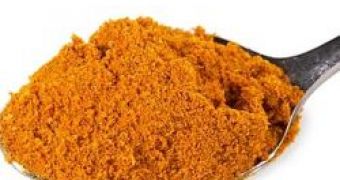Curcumin compound in curry spice is extremely potent against Alzheimer's disease, according to a new study conducted by a team of researchers at the David Geffen School of Medicine at UCLA. More exactly, the curcumin ingredient helps the immune system of a patient clear up the amyloid beta found in his brain, with amyloid beta being the neuronal plaque present in all sufferers of the neurodegenerative disease.
Previous studies have also linked curcumin compound found in curry and turmeric to other severe diseases, showing the beneficial effects of the chemical in treating a wide range of health disorders. Curcumin is the yellow pigment found in the curry spice turmeric. Turmeric is commonly known as one of the cheapest spices, that has been used since antiquity as a condiment and also as dye.
Originating in South East Asia, the turmeric contains curcuminoids that are the most beneficial ingredients of this plant. Previous researches found that curcuminoids have antioxidant, antibacterial and anti-inflammatory effects upon human body.
Also, the turmeric intake helps supporting the health of the liver, prevents high doses of cholesterol in our organism and is being studied by scientists for its tumor-blocking ability. As an anti-cancer agent, turmeric has been found to block the uncontrollable growth of melanoma tumor cells, cells that lead to breast and colon cancer, leukemia etc.
Writing in the Journal of Alzheimer's Disease, researchers involved in the current study highlighted the fact that curcumin compound, known for its anti-inflammatory and anti-oxidant properties, can successfully erase the beta amyloid plaque forming in the brain of some individuals, which brings about Alzheimer's disease.
Leader of the research Dr. Milan Fiala concluded: "Curcumin improved ingestion of amyloid beta by immune cells in 50 percent of patients with Alzheimer's disease. These initial findings demonstrate that curcumin may help boost the immune system of specific Alzheimer's disease patients. We are hopeful that these positive results in a test tube may translate to clinical use, but more studies need to be done before curcumin can be recommended."

 14 DAY TRIAL //
14 DAY TRIAL //